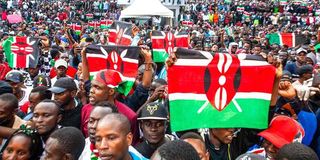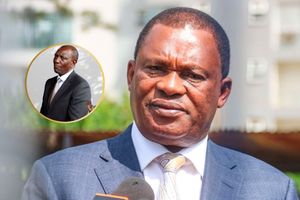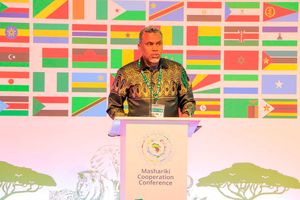
Participants during the Shujaaz Memorial concert held on July 7, 2024 at Uhuru Park in Nairobi.
For decades, Kenya has been enchanted as “the Land of Patriots.” But for more than two years the country has witnessed a titanic clash of patriotisms, climaxing in the high-voltage politics of March 2025.
Kenya’s high-voltage politics has echoes of the famous warning from Shakespeare's play, Julius Caesar: “Beware the Ides of March", to be wary of March 15, the day the great Ancient Roman politician and military General was assassinated.
We now know that the lofty idea of patriotism, one of the strongest human spirits, refers to a deep sense of love and loyalty for one’s country of birth. But patriotism is not seamless. According to the German philosopher, Friedrich Hegel, patriotism has two faces: the ‘hard’ face of war and the ‘soft’ face of values — which he identified with the Western liberal state.
In Kenya’s ‘Ides of March’, the two shades of patriotism are poised for a clash. One shade is ‘soft patriotism.’ This is the in-built or intuitive love of Kenya, which Roger Whittaker’s beautiful and eternally patriotic melody, “My land is Kenya” evokes. Soft patriotism is not inferior but carries the ideals of our motherland as a moral nation. Our national Anthem, a patriotic song, carries in one potent capsule the soft values of our inclusive nation of virtue: justice, equality, liberty, unity, peace, love and hard work. At home and in the diaspora, Kenyans have invoked the slogan of ‘Kenya ni home’ (Kenya is home) to assert the patriotic love and devotion to mother Kenya above any her individual child.
The second shade, ‘hard patriotism’, is a more challenging form with a distinctive martial tinge. While widely associated with our uniformed forces who swear the oath of duty, honour and service to the country, hard patriotism has always become necessary for all citizens in case the nation are at war, either with themselves or with an external enemy.
Hard patriotism
“Soft patriotism’ can easily morph into ‘hard patriotism’ in the context of lack of justice and a culture of impunity — where those in power continue to act without fear of consequences, unjust and harmful actions are widespread and those responsible are not held accountable. Soft patriotism is morally anchored on the idea of the “soul force,” the power of non-violent resistance and love as a tool for social and political change, popularised largely by Mahatma Gandhi and Martin Luther King, Jr.
But not every patriot embraces the idea of ‘soul force.’ This is exactly the story of the Mau Mau in Kenya and Malcolm X and the Black Panthers in America, who believed that nonviolent protests could not truly liberate the black people or give them power over their own lives. This idea birthed Dr King’s famous axiom: “the arc of the moral universe is long, but bends toward justice,” which means that while the path to end injustice and attain moral progress may be slow and arduous, it ultimately leads to a more just and equitable world.
But what exactly is fueling the debate on patriotism in Kenya? From early 2024, young Kenyans started using myriad platforms, patriotic gestures and strategies to push for a new moral order. They protested against corruption, high taxation, cost of living, poverty, inequality and youth unemployment, declined quality and access to welfare services such as education and health and human rights abuses (abductions, enforced disappearances and extra-judicial police killings).
This culminated in the youth-led Kenya Finance Bill revolt, popularly known as the Gen Z protests in June 2024. While the protests followed the Gandhian idea of the “soul force”, they stridently took a violent turn when protesters stormed Parliament on June 25, leading to clashes with police, which resulted in at least 22 deaths, numerous injuries and the controversial deployment of armed soldiers to help the police contain escalating riots.
Gen-Z revolt
In the post-Gen-Z revolt, patriotism has become a new buzzword, now colouring President Ruto’s manoeuvres to nip a potential revolution, reorganise power, stabilise the polity and realign politics for his 2027 re-election. Ruto co-opted Mr Odinga and his loyalists in the Orange Democratic Movement (ODM) as well as close allies of former President Uhuru Kenyatta into a ‘broad-based government’ as a counter-weight to impeached Deputy President Rigathi Gachagua, who Ruto accused of being ‘unpatriotic’ and fueling the youth-led anti-government protests.
‘Patriotism’ has almost become a national hymn in the wake of Odinga’s failure to clinch top seat at the African Union Commission and the subsequently signing of a new power deal between his ODM and Ruto’s United Democratic Alliance (UDA) on March 7, 2025. On March 13, 2025, Dr. Ruto described Mr. Odinga as “the foremost patriotic citizen” for accepting to work with him.
On his part, Odinga has marketed the handshake as a charitable act of patriotism, with some intellectual ranking him “at the top of the pyramid of Kenyan patriots”. In a March 14, 2025 interview, Odinga sensationally claimed that he “saved President Ruto from military coup,” which the Ministry of Defence swiftly refuted.
But ahead of the Financial Bill 2025, Kenya’s top securocrats fret that the country might be facing another bout of deadly protests, warning against “those scheming regime change through extra-constitutional means.” Fueling this fear are videos filmed at various nightclubs in parts of the country and crowds breaking into wild chants of “Ruto Must Go!” The latest of these ‘must-go’ chants was during the Harambee Stars vs Gabon match attended by President Ruto and ODM leader Raila Odinga at Nyayo National Stadium on March 23, 2025.
On March 27, 2025, as a jolt from the blues, Kenya’s Chief of Defence Forces (CDF) General Charles Kahariri warned that “when some people say they are tired with this government, a government they elected on their own and say ‘must go’; that ‘must go’ must be done according to the Constitution.” The Director-General of the National Intelligence Service (NIS), Noordin Haji, followed suit, warned that divisive politics, and weaponisation of ethnicity could polarize Kenyans and morph into a state of national instability.
Their message is crystal clear: Kenya’s military will not stand by and watch as a new wave of protests remove President Ruto outside the framework of the Constitution. But perhaps unbeknown to the security chiefs, the entry of the military into the civilian space and use of force to protect, takeover or organize power amounts to a military coup d'état! Sustainable power is just power. Period. A tiger never proclaims his tigritude, he pounces. Let our patriotism speak for itself.
Professor Peter Kagwanja is s a Kenyan intellectual, adviser, and policy strategist.










